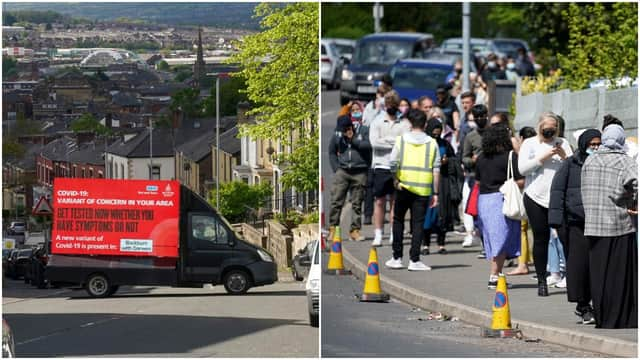What is local travel advice for Indian variant hotspots? Government guidance for areas in England explained


Government ministers have backtracked on advice urging people in parts of England hit hardest by the Indian Covid variant not to travel following widespread confusion.
New guidance issued on the government’s coronavirus restrictions website on Friday (21 May) said those living in eight different places should not travel into or out of their area and should adopt “an extra cautious approach”.
Advertisement
Hide AdAdvertisement
Hide AdThe advice has since been amended after MPs criticised the government for publishing it without any widespread announcement. Some of the affected local authorities also said they were not informed about the new advice.
Ministers have warned that outbreaks of the variant of concern could delay the final stage of lockdown easing in England on 21 June.
So, which areas in England have been worst affected by the Indian variant - and what is the updated guidance?
Here is everything you need to know.
Which areas are affected by the government guidance?
Eight local authority areas where the variant first identified in India is most prevalent have been targeted by the amended government advice.
Advertisement
Hide AdAdvertisement
Hide AdIt applies to Bedford, Blackburn with Darwen, Bolton, Burnley, Kirklees, Leicester, Hounslow and North Tyneside.
What is the amended Covid advice?
The guidance, published on a government web page titled “what you can and cannot do”, was updated on Tuesday evening (25 May) to advise people living in those areas to adhere to the following restrictions:
- Meet outside instead of inside where possible
- Keep two metres away from friends and family you don’t live with - except if you have formed a support bubble
- Minimise travelling in and out of the affected areas.
Before the advice was amended, the latter instruction was to avoid non-essential travel altogether.
Advertisement
Hide AdAdvertisement
Hide AdTransport Secretary Grant Shapps said that the guidance should have been “clearer” and that ministers would “learn from that”. However, he added that he did not think the change in advice was very “complicated”.
Speaking to BBC Breakfast on Wednesday (26 May), he said: "This is not a new lockdown, this is not law, this is just some advice.”
People in the eight areas affected by the Indian variant should also:
- Take a free lateral flow test twice a week, and self-isolate if the result is positive
- Take part in local surge testing
- Work from home where possible
- Get vaccinated when invited.
Advertisement
Hide AdAdvertisement
Hide AdA Downing Street source denied it was a local lockdown by stealth following backlash about the new advice.
They said it was advice, not law, and that all eight areas had entered England’s next step out of lockdown on 17 May.
What was the initial reaction?
Local authorities affected by the original guidance before it was updated responded angrily, claiming they were not consulted by the government about the advice.
Yasmin Qureshi, Labour MP for Bolton South East and shadow international development minister, said: “I was not informed of this and I understand nor was anyone else in Bolton.
Advertisement
Hide AdAdvertisement
Hide Ad“I’m just gobsmacked. They’re making such an important announcement and they don’t even have the decency to tell us or tell our constituents.
“This is typical of this Government’s incompetence.”
Newly elected West Yorkshire mayor Tracy Brabin added the change could cause “anxiety and confusion”.
Ms Brabin said she would raise the matter urgently with vaccines minister Nadhim Zahawi on Tuesday (25 May).
She tweeted: “If the government is concerned we need clear guidance and support not advice that could cause anxiety and confusion.”
Advertisement
Hide AdAdvertisement
Hide AdMeanwhile, North Tyneside Council said officials did not know about the guidance until Monday (24 May).
And Blackburn with Darwen's director of public health Dominic Harrison said in a Tweet that the affected areas "were not consulted with, warned of, notified about, or alerted to this guidance".
Layla Moran, chairwoman of the All Party Parliamentary Group on Coronavirus, said updating the guidance without a proper announcement “is a recipe for confusion and uncertainty”.
“Local people and public health leaders in these areas need urgent clarity from the Government. Matt Hancock must come before Parliament and make a public statement to explain these new rules,” she said.
Advertisement
Hide AdAdvertisement
Hide AdHowever, a Downing Street source insisted all the areas were informed about the advice.
A spokesperson for the Department for Health and Social Care said: "We provided additional guidance for those living in affected areas when we became aware of the risk posed by the variant, to encourage people to take an extra cautious approach when meeting others or travelling."
